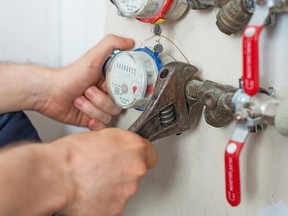Dan Fumano: Only 13 per cent of Vancouver’s single-family homes have metered water connections. West Vancouver has universal water metering, which has been associated with a 45 per cent reduction in demand.

Vancouver council will consider installing water meters on all existing homes and eventually moving toward a pay-what-you-use model to promote conservation.
Recommended Videos
ABC Coun. Sarah Kirby-Yung will introduce a motion at next week’s council meeting to explore the costs and benefits of introducing water meters to existing buildings citywide.
Water meters are required on new buildings in Vancouver, but Kirby-Yung said she is “focusing here on what’s un-metered — which is really around the typical, legacy, single-family users.”
The motion would direct staff to report back later this year on options and timelines for installing meters to measure water use on all existing single detached houses and duplexes, condo and apartment buildings, and commercial properties.
Surrey and Langley also have water metering. In West Vancouver, all single-family and multi-family homes have metered connections, which has been associated with a 44 per cent reduction in demand.
Only 13 per cent of the City of Vancouver’s single-family homes have metered water connections.
“We’re having so many conversations around electricity right now. Do we have enough? What’s our projected generation as we build out new homes?” Kirby-Yung said. “But we’re not having the same conversation about water.”
“I think we do take water for granted,” Kirby-Yung said.
Staff at Metro Vancouver expect water shortages to become more frequent in the future, she said. “So it makes sense to get ahead of this.”
Lower Mainland municipalities buy water in bulk from the Metro Vancouver regional authority, with the City of Vancouver spending more than $100 million annually. Metro Vancouver recommends water metering as a best practice, as do other government and non-governmental organizations, but decisions about its implementation fall under municipal jurisdiction.
“Water meters are a fair and equitable way of charging residents for water,” Kirby-Yung’s motion reads. “Water metering encourages conservation by giving residents and businesses direct feedback on their consumption, which leads to a reduction in overall water demand.”
A system where everyone pays for what they use should see most people’s bills go down, Kirby-Yung said. Other jurisdictions that adopted universal metering found that a small number of households were using a disproportionate volume of water, thereby skewing the cost for everyone else, she said.
Under a system where households pay a flat rate instead of based on usage, heavy water users — such as homeowners with large yards, gardens, and swimming pools, for example — are effectively “freeloading off their neighbours,” said Werner Antweiler, an economist and professor at the University of B.C.’s Sauder School of Business.
“With any change, you get some people who gain and some people who lose,” said Antweiler. “The rich homes with swimming pools, they’re probably going to be the ones complaining the loudest. I think the opposition here is not coming from the small households, the low-income households. It’s going to be from the rich folks who think that their perks should be subsidized by everybody — a big house and a pool.”